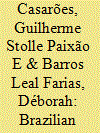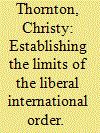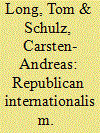|
|
|
Sort Order |
|
|
|
Items / Page
|
|
|
|
|
|
|
| Srl | Item |
| 1 |
ID:
188676


|
|
|
|
|
| Summary/Abstract |
This paper engages with debates over the Liberal International Order (LIO) and Latin America by focusing on Brazil. More specifically, it addresses President Jair Bolsonaro’s foreign policy. His radical-right populist and religious-infused approach has been characterised by an explicit rejection of practically all elements of the LIO, including multilateralism, multiculturism, and regionalism—historically core features of Brazilian foreign policy. We seek to answer two interrelated questions: (1) what were the political conditions—domestic and international—that allowed for such dramatic foreign policy change? (2) what impact is Brazil’s new foreign policy orientation having on the LIO? To address them, we resort to the aspirational constructivist theory, which has allowed us to theorise Brazil’s new identity formation. We argue that Bolsonaro has reshaped Brazil’s foreign policy as part of his endeavour to create a national self-image based on three pillars: anti-globalism, anti-Communism, and religious nationalism. By doing so, the Bolsonaro administration has transformed Brazil, otherwise an avid supporter of the LIO, into one of the order’s most vocal critics. While anti-globalism (and, subsidiarily, anti-Communism) undermines the normative and institutional foundations of the LIO, religious nationalism offers a replacement to the order, based on independent ethno-nationalist communities. If Brazil’s radical right populist model spreads across Latin America, it has the potential to hollow out the region’s support to the LIO.
|
|
|
|
|
|
|
|
|
|
|
|
|
|
|
|
| 2 |
ID:
188675


|
|
|
|
|
| Summary/Abstract |
Latin American foreign-policy elites defend the principle of non-intervention to shield their countries’ autonomy. By 2005, however, most Latin American foreign policy elites accepted the easing of limits on the use of force in international law. They supported the Responsibility to Protect (R2P), which regulates the use of force to protect populations from mass atrocities. The paper presents a comparison of the Brazilian, Chilean, and Mexican positions in the R2P debates to understand why they supported this norm. During the debates leading to the emergence of R2P, these elites questioned a central premise of liberal internationalism: the idea that great powers would restrain their use of military force as part of their commitment to a liberal international order (LIO). Using Republican international political theory, I argue that these Latin American foreign-policy elites viewed a restricted humanitarian-intervention norm as a new defence against great powers interfering in developing countries. Instead of trusting that great powers would restrain their actions, these elites advocated for a humanitarian-intervention norm that would prevent uncontrolled humanitarian interventions.
|
|
|
|
|
|
|
|
|
|
|
|
|
|
|
|
| 3 |
ID:
188674


|
|
|
|
|
| Summary/Abstract |
Nine regional international organisations (RIOs) have adopted suspension clauses to defend democracy since 1990, but we have a weak historical understanding of the conditions under which these clauses are designed. The literature has advanced numerous arguments about delegation, generally based on power, preferences and norms. This article asks under what conditions RIO member states support suspension clauses for democracy enforcement, and what shapes their preferences over the design of said clauses. Taking the lock-in hypothesis as a starting point, I offer an alternative explanation to that of regime type: the nature of a state’s anti-democratic experiences determines its preferences for expansive or restrictive multilateral democracy enforcement. States that suffered from external threats to their political regime will prefer a narrow scope and restricted use of suspension clauses, while those that suffered primarily from internal threats will be in favour of a broader role for RIOs and a more readily applicable suspension clause. I test the plausibility of this explanation in a case study which reconstructs the negotiations for the first such suspension clause in this era, the 1992 Washington Protocol amending the Charter of the Organisation of American States (OAS).
|
|
|
|
|
|
|
|
|
|
|
|
|
|
|
|
| 4 |
ID:
188673


|
|
|
|
|
| Summary/Abstract |
Using a historical analysis based on archival research in Mexico, the United States, and Great Britain, this article argues that as Latin American negotiators waged campaigns for reforms to rules for trade, investment, and development lending in the twentieth century, they came to inadvertently illustrate what was acceptable and what was impossible within the terms of the Liberal International Order (LIO). In each of the three episodes examined, US government officials actually acquiesced to the demands of experts and political figures from the developing world, agreeing to broad international frameworks that were intended to scale-up the welfarist vision of ‘embeddedness’ to the international arena. But in each of these cases, those government officials subsequently saw their concessions vetoed by the action of powerful capitalist interests fearful of what the limits to power might mean for their bottom lines. It was in this struggle unfolding over time—as representatives from Latin America and elsewhere in the industrialising world tried to build an infrastructure of development that would meaningfully embed US capital in a framework of rights and obligations, and as capital organised to respond, rallying business associations and allied government representatives—that the limits of the LIO came to be defined.
|
|
|
|
|
|
|
|
|
|
|
|
|
|
|
|
| 5 |
ID:
188672


|
|
|
|
|
| Summary/Abstract |
Recent studies on international law and liberalism have shown convincingly that both liberal internationalism and international law have played a central role in the international politics of Latin America and that Latin American countries have contributed to the consolidation of multilateralism and the Liberal International Order (LIO). Yet, the connections between the institutionalisation of international law and the rise of liberal internationalism in the region have tended to be overlooked. This article examines the genealogy of these connections, focusing on the emergence of two contending legal traditions, a solidarist liberal internationalist tradition and a pluralist and political one. The article argues that the emergence of these opposing legal traditions across the region have had a contradictory impact on the formation of the LIO, contributing to its emergence and consolidation by promoting multilateralism, and to challenging and revising some of its fundamentals when stressing a strong attachment to absolute non-intervention.
|
|
|
|
|
|
|
|
|
|
|
|
|
|
|
|
| 6 |
ID:
188669


|
|
|
|
|
| Summary/Abstract |
The contributions to this special issue take a Global South perspective rooted in the long experiences of Latin American countries with international organisation, laws and norms. Contributors explore how the weaker, poorer, and presumed subordinate Latin American states have contributed to and challenged the construction and development of today’s Liberal International Order (LIO). The articles in this special issue ask what Latin American experiences in different domains and historical periods can tell us about the LIO as it now fractures and reconstitutes. The core argument among these essays is that, despite inherent contradictions and tensions, Latin American engagements with the LIO have attempted to level the playing field and prevent the reinforcement of existing international hierarchies. The contributions to this special issue demonstrate that Latin American actors were not mere norm-takers and passive supporters of the LIO. Latin American actors have often sought to hold the leaders of the LIO to their own promises. They have insisted that the rules of a rules-based order should apply not just to the poor, weak or indebted but to the rich, strong and powerful as well.
|
|
|
|
|
|
|
|
|
|
|
|
|
|
|
|
| 7 |
ID:
188670


|
|
|
|
|
| Summary/Abstract |
Although Latin America plays a minimal role in debates on the ‘liberal international order’, scholars recognise the region’s influence on international law, norms, and institutions. We contend that these Latin American contributions to international order spring from a tradition of ‘republican internationalism’, rooted in the region’s domestic political traditions and practices. Republican principles such as the separation of power, association, and the rule of law had important corollaries in Latin American international relations, including sovereign equality, confederation and regional cooperation, and international law and arbitration. These republican internationalist ideas shaped Latin America’s diplomatic traditions and its contributions to international order in the nineteenth century and beyond. Attention to republican internationalism and Latin American contributions demonstrates how actors beyond the North Atlantic shaped the origins of international order. This study also advances debates on the sources of the liberal international order by demonstrating the distinctive influence of republican ideas and practices.
|
|
|
|
|
|
|
|
|
|
|
|
|
|
|
|
|
|
|
|
|